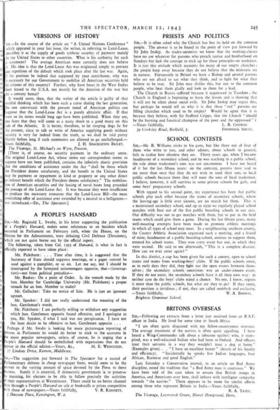SCHOOL CONTESTS
Snt,—Mr. R. Williams sticks to his guns, but like three out of four of those who write to you, and other editors, about schools in general, fails to realise how obsolete they are. Thirty years ago, when I became headmaster of a secondary school, and he was teaching in a public school, the rule about tradesmen's sons was not uncommon. I have not heard of it for the last •fifteen years: on the contrary, parents have said to me more than once that they do not wish to send their sons to local public schools because there they will meet the sons of local tradesmen. I believe, however, it still survives in some private schools for girls, and some boys' preparatory schools.
With regard to his second point, my experience has been that public schools play each other because the teams a secondary schools, where
the leaving-age is little over sixteen, are no match for them. This is a maintained secondary school, and up to 1939 we regularly' played school matches with four out of the five public boarding schools in our area.
Our difficulty was not to get matches with them, but to put in the field teams which could give them a game. During the last fifteen years, many well-meaning attempts have been made to promote athletic meetings in which all types of school may meet. In a neighbouring southern county, the County Athletic Association organised such a meeting, and a friend of mine, headmaster of a public boarding-school, anxious to support them, entered his school teams. They won every event but one, in which they were second. He said to me afterwards, "This is a complete disaster. How can we ever enter again?"
In this district, a cup has been given for such a contest, open to school teams and teams from working-boys' clubs. If the public schools enter, as in early days they did, they. fight out the open events between them- selves ; the secondary schools sometimes win an under-sixteen event. If they do not enter, the secondary schools have it all their own, way: in neither case do the boys' clubs stand a chance. No one, I know, regrets it more than the public schools, but what are they to do? If they enter, their position is invidious ; if not, they are called snobbish and exclusive.


























 Previous page
Previous page